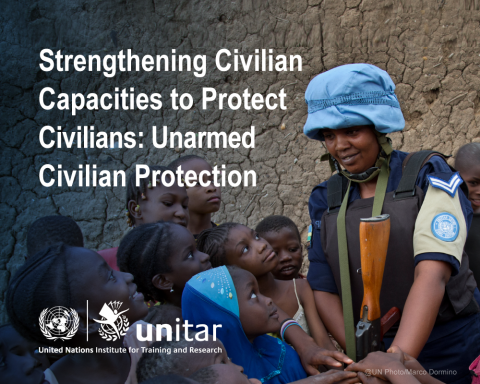
Strengthening Civilian Capacities to Protect Civilians: Unarmed Civilian Protection [PTP.2023.14E]
According to the World Bank, more than 1.5 billion people live in countries affected by repeated violence. In absolute terms, the need for direct physical protection of civilians against imminent violence has never been greater than it is today. Local and international actors are struggling to protect all those under direct threat, wherever conflict occurs. A small number of civil society and humanitarian organizations have begun providing direct physical protection for civilians through a method called Unarmed Civilian Protection (UCP), which promotes nonviolent means for a community to protect itself from violence.
The aim of this advocacy presentation is to raise awareness for and increase understanding of UCP. It starts by explaining the need for UCP, followed by an introduction to its key principles and methods, and finally describing how it fits into wider protection efforts and global discourses.
By the end of this course, participants will be able to:
- Differentiate UCP from conventional peacekeeping;
- Place UCP in the history of nonviolence, protection and conventional peacekeeping;
- Define UCP and relevant terms linked to it;
- Describe the actors within UCP; and
- Locate UCP within key global discourses.
The course answers nine questions in sequence:
- Why do we need to protect civilians?
- Who has the responsibility to protect civilians?
- What is unarmed civilian protection?
- How does UCP work?
- Why does UCP work?
- How does UCP complement wider protection efforts?
- What are the strengths of UCP?
- How is UCP linked with key global discourses?
- What can you do?
The average work time is estimated at 1 hour.
This advocacy course is a self-guided, self-paced, web-based course that is on-going and can be accessed at any time. The material is presented in text format with visual aids and web-based reference resources. Regular activities allow the participant to test their understanding of and reinforce the message of the course.
Primary audience: The course is designed for high level decision makers who can help shape global policy on Unarmed Civilian Protection, including diplomats, policy makers, politicians, donors, journalists, humanitarians, civil society and other human development leaders.
Secondary audience: The course is also geared towards students and any persons or groups with an interest in understanding and advocating for the better inclusion of Unarmed Civilian Protection into global peacekeeping efforts. Participants are not expected to have any prior experience or knowledge to take this course, other than:
- Having a good command of the English language (reading and writing);
- Being computer literate.
Technical Requirements
UNITAR recommends the following as a minimum in hardware and software to take our e-Learning courses. Please consult your Network Administrator or Systems person to ensure that you have the following:
Hardware requirements
- Desktop or laptop computer with Windows 10 or MacOS version 11 and later
- Tablet or mobile devices are not fully supported on some course tools
- Stable LAN or Wifi Internet connection
Browser
- Latest version of Mozilla Firefox (download for free at https://www.mozilla.org)
- Latest version of Google Chrome (download for free at https://www.google.com/chrome)
- Microsoft Edge or Safari (included in your computer)
Other software
- PDF reader (download for free at https://get.adobe.com/uk/reader)
- Microsoft Office for Windows or MacOS (compatible software can be downloaded at http://www.openoffice.org/)
- Video player (Quicktime for MacOS, Windows Media Player or compatible video player)
- Anti-virus
Other requirements
- Disable Pop-up blockers
- Enable cookies and java
- webcam and audio headset for courses that will require online meetings
- additional storage in case you need to download course materials
You will receive an email within 48 hours with the detailed information on how to proceed.

